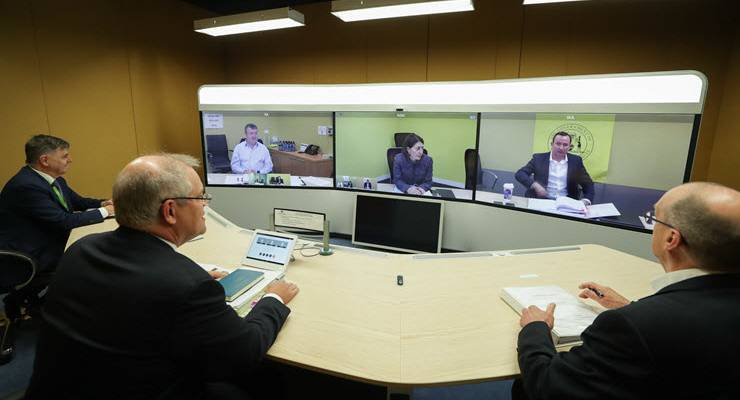
Ready, aim, shoot yourself in the foot
Presumptive Democratic presidential nominee Joe Biden has barely been seen during the COVID-19 crisis, aside from a couple of slick campaign ads and a few think pieces reassessing what constitutes a healthy degree of skepticism.
But tonight he is holding a “virtual conversation” fundraiser with Democratic national committee chair Tom Perez and people’s champion Hillary Clinton.
Attendees can contribute funds at various levels: there are “limited availability” tickets that cost US$2800, “guest” at US$5600, “friend” at US$15,600, “supporter” at US$41,100, “champion” at US$50,000. To earn the title of “host” will set you back US$100,000.

In April alone, 20 million Americans lost their jobs. In that atmosphere, the knowledge that you need thousands of dollars for the privilege of a Zoom call, reinforces the underlying disparity between those who can access politicians and those affected by their decisions.
What presidents take
Staying in the US, President Donald Trump took time out from his busy schedule of borderline criminal negligence to announce that he’s gobbling anti-malaria drug hydroxychloroquine as a preventative measure.
On reflection, this might be the most presidential thing he’s done yet.
John F Kennedy, while running for office and then occupying it, was a profoundly unwell man — wrestling with Addison’s Disease, colitis, osteoporosis, and prostatitis among other ailments.
Robert Dallek’s An Unfinished Life catalogues the apothecary’s worth of painkillers, steroids, and antibiotics pumping through Kennedy’s system at any given time — up to 12, sometimes competing, medications.
More recently, you have Bill Clinton’s typically equivocal take on the question of what level of inhalation rendered him a drug user, Barack Obama’s secret love of cigarettes, and George W Bush’s well-documented struggles with alcohol. Going way back to the beginning, George Washington grew hemp (and possibly did more than that?).
Our favorite is the 100% true rumour that Ed Muskie, one of the Democratic candidates covered in Hunter S Thompson’s Fear and Loathing on The Campaign Trail ’72, was addled by psychotropic root ibogaine during his campaign. Thompson explained away a stumbling speech performance by speculating that “Muskie’s brain was almost paralyzed by hallucinations at the time; that he looked out at the crowd and saw gila monsters instead of people, and that his mind snapped completely”.
Power deficit disorder
While we never heard back from Tony Abbott about whether he’d passed on our details to Andrew Hastie, the answer arrived in a different form this morning — an email from Hastie himself.
Hastie’s correspondence — to some 24,000 people, if the figures in Abbott’s original email are to be believed — praised Abbott’s “leadership as a champion of the values that have made Australia great”, while canvassing for signatures on his “push back against China” petition.
A reminder, all this is absolutely legal — every political party has a file on you, collecting all the data it’s bought from Facebook, or that you’ve provided by engaging with them (say, via a newsletter or petition). And because the political parties are exempt from the Privacy Act, you have no privacy rights relating to this. You can’t find out what political parties know, you can’t correct false information, and you have no control over who they give that information to.
Unity ticket
One of the amusing aspects of the mainstream media’s COVID-19 coverage, which has varied from workmanlike to “team Australia” pathetic, is the insistence that the “national cabinet” is some sort of remarkable innovation. Nine journalists called it “unprecedented“; over at News Corp it was a “war cabinet”.
They seem oblivious to the fact that “national cabinet” is actually “COAG”, which meets regularly through the year in normal circumstances anyway; it has merely been meeting frequently to handle the pandemic (it’s also why the idea that Anthony Albanese should join it was silly — he doesn’t run anything, in the same way state opposition leaders don’t run anything).
Now the “national cabinet” idea is mutating.
Yesterday the Australian Financial Review breathlessly reported that “the government will seek to replicate the success of the national cabinet in planning the country’s response to COVID-19 by forming a group of state and federal ministers to target technology use across business and government”.
Except the “meeting of digital economy and technology ministers … convened by Minister for Industry, Science and Technology Karen Andrews” sounds a lot like, erm, an ordinary ministerial council. A large number of these operate across areas where Commonwealth and state responsibilities overlap (and absorb ridiculous amounts of public servants’ time in preparation of barely-read agenda papers).
Indeed, it sounds particularly familiar given until 2018 there was an industry ministers council and there’s still a data and digital council that handles technology use in government.
Still, national cabinet and all that — maybe if China launches a major cybersecurity assault on Australia it can be upgraded to journalists’ treasured “war cabinet”?
Have you heard a tip or murmur? Let us know.








Crikey is committed to hosting lively discussions. Help us keep the conversation useful, interesting and welcoming. We aim to publish comments quickly in the interest of promoting robust conversation, but we’re a small team and we deploy filters to protect against legal risk. Occasionally your comment may be held up while we review, but we’re working as fast as we can to keep the conversation rolling.
The Crikey comment section is members-only content. Please subscribe to leave a comment.
The Crikey comment section is members-only content. Please login to leave a comment.